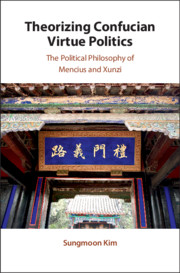'A systematic reconstruction of the political theories of two of the leading classical Confucian thinkers, Mencius and Xunzi, by one of the rising stars of East Asian political theory. Sungmoon Kim’s new book lays out a theory of Confucian constitutionalism oriented around civic virtue and ritual. In this important contribution to political theory and the history of political thought, Kim displays the clarity and deep erudition that his readers have come to expect.'
Stephen Macedo - Princeton University, New Jersey
'Professor Sungmoon Kim has already established an international reputation with his previous books on Confucian democracy. His latest work, Theorizing Confucian Virtue Politics, is sure to solidify his place as a leading contemporary political theorist and scholar of Confucianism. This book is sure to be of great interest to scholars across a variety of fields, including philosophy, political science, Sinology, history, and religious studies.'
Bryan W. Van Norden - Vassar College, New York
'With characteristic thoroughness, depth, and breadth, Sungmoon Kim’s new book enables a broader audience to appreciate the political theories of Mencius and Xunzi … Of particular note is Kim’s reflection on the global political theory of these thinkers and how they wrestled with interstate conflict while maintaining their virtue politics. Kim illuminates the foundational debates of virtue politics, inviting all of us to think about how these are and might be important in the current global era.'
Brooke Ackerly - Vanderbilt University, Tennessee
'Nuanced and lucid … [Kim’s] analysis of the political philosophy of these seminal figures in terms of virtue constitutionalism, ritual constitutionalist, positive Confucianism and negative Confucianism is both refreshing and insightful. I highly recommend this book to everyone who is interested in Confucian philosophy and political theory.'
Chenyang Li - Nanyang Technological University
'Theorizing Confucian Virtue Politics provides a newly elaborated, classical Confucian constitutionalism … Venturing into some largely unknown territory, this book should invigorate further work on the parts of comparative philosophers and Western virtue theorists.'
D. P. Prianti
Source: Choice
'The book is likely to be of interest primarily to specialized scholars and researchers in Confucian political theory … an enjoyable and enlightening read also for general students of Chinese culture and religion.'
Lehel Balogh
Source: Religious Studies Review
‘This is a very good book, and I highly recommend it to anyone interested in Confucian political philosophy and comparative civic virtue theory.’
Haimo Li
Source: Dao



